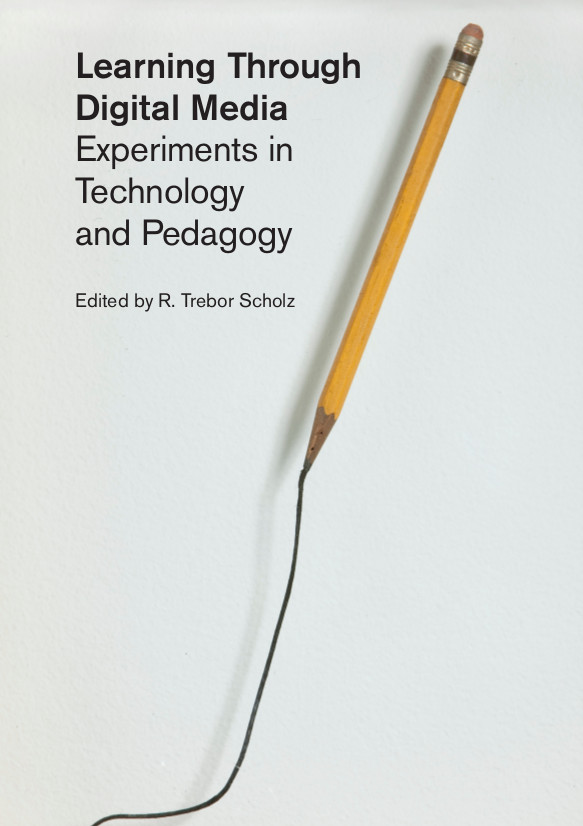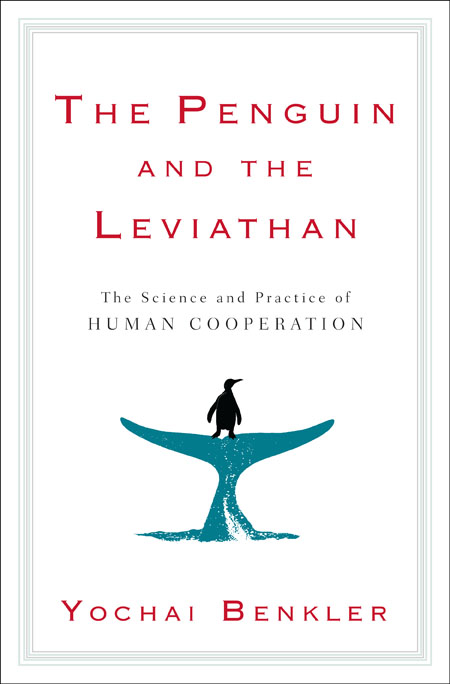Trebor Scholz (ed.): Learning Through Digital Media: Experiments in Technology and Pedagogy (2011)
Filed under book | Tags: · digital media, education, labour, learning, media studies, pedagogy, social media, software, web

“The simple yet far-reaching ambition of this collection is to discover how to use digital media for learning on campus and off. It offers a rich selection of methodologies, social practices, and hands-on assignments by leading educators who acknowledge the opportunities created by the confluence of mobile technologies, the World Wide Web, film, video games, TV, comics, and software while also acknowledging recurring challenges.” (from Introduction)
“This publication is the product of a collaboration that started in the fall of 2010 when a total of eighty New School faculty, librarians, students, and staff came together to think about teaching and learning with digital media. These conversations, leading up to the MobilityShifts Summit, inspired this collection of essays, which was rigorously peer-reviewed.
The Open Peer Review process took place on MediaCommons, an all-electronic scholarly publishing network focused on the field of Media Studies developed in partnership with the Institute for the Future of the Book and the NYU Libraries. We received 155 comments by dozens of reviewers. The authors started the review process by reflecting on each other’s texts, followed by invited scholars, and finally, an intensive social media campaign helped to solicit commentary from the public at large.” (from About)
Publisher The Institute for Distributed Creativity, New York, 2011
Creative Commons NoDerivs, Non-Commercial, Attribution, ShareAlike License
ISBN 97806154514480
338 pages
Book website (archived)
PDF, PDF (12 MB, updated on 2016-6-19)
EPUB, EPUB (3 MB, updated on 2016-6-19)
HTML essays (archived)
Fibreculture journal, 18: trans (2011)
Filed under journal | Tags: · ecology, internet, media archeology, network culture, new media, software, tactical media, web
“It is now perhaps a commonplace that digital, networked and informational media are extremely transient. They diversify in form and function at a dizzying rate. At the same time, they transit and fuse “social” and “natural” differences in a manner which reconfigures all the worlds involved. It is also perhaps a commonplace to suggest that some established powers have found it difficult to come to grips with this (although this is perhaps beginning to change). For many, from seriously challenged newspaper proprietors to established media disciplines, it might be time to pause for breath, if only for a moment—to regroup and adapt established practices and ideas, to count the survivors from among the old media worlds of just a few years ago.
While occasionally sympathetic, issue 18 of the Fibreculture Journal questions this approach. If we pause for breath, it is to take in the new air. This issue draws on the accelerated evolutions of media forms and processes, the microrevolutions in the social (and even the natural sciences) that dynamic media foster, even the way in which “new” media lead us to reconsider the diversity of “old” media species. Summed up simply here under the sign/event of the “trans,” this issue catalyzes new concepts, accounts of and suggestions for new practices for working with all these processes.”
Articles:
Petra Gemeinboeck and Rob Saunders: Other Ways Of Knowing: Embodied Investigations of the Unstable, Slippery and Incomplete
John Tinnell: Transversalising the Ecological Turn: Four Components of Felix Guattari’s Ecosophical Perspective
Vince Dziekan: Anxious Atmospheres, and the Transdisciplinary Practice of United Visual Artists
Kristoffer Gansing: The Transversal Generic: Media-Archaeology and Network Culture
Christoph Brunner and Jonas Fritsch: Interactive Environments as Fields of Transduction
Troy Rhoades: From Representation to Sensation: The Transduction of Images in John F. Simon Jr.’s ‘Every Icon’
Michael Dieter: The Becoming Environmental of Power: Tactical Media After Control
Simon Mills: Concrete Software: Simondon’s mechanology and the techno-social
Fenwick McKelvey: A Programmable Platform? Drupal, Modularity, and the Future of the Web
Edited by Andrew Murphie, Adrian Mackenzie and Mitchell Whitelaw
Publisher Fibreculture Publications/The Open Humanities Press, Sydney, Australia, October 2011
ISSN 1449-1443
Yochai Benkler: The Penguin and the Leviathan: How Cooperation Triumphs Over Self-Interest (2011)
Filed under book | Tags: · biology, business, collaboration, economics, floss, neuroscience, politics, psychology, society, sociology, software, technology, web

What do Wikipedia, Zip Car’s business model, Barack Obama’s presidential campaign, and a small group of lobster fishermen have in common? They all show the power and promise of human cooperation in transforming our businesses, our government, and our society at large. Because today, when the costs of collaborating are lower than ever before, there are no limits to what we can achieve by working together.
For centuries, we as a society have operated according to a very unflattering view of human nature: that, humans are universally and inherently selfish creatures. As a result, our most deeply entrenched social structures – our top-down business models, our punitive legal systems, our market-based approaches to everything from education reform to environmental regulation – have been built on the premise that humans are driven only by self interest, programmed to respond only to the invisible hand of the free markets or the iron fist of a controlling government.
In the last decade, however, this fallacy has finally begun to unravel, as hundreds of studies conducted across dozens of cultures have found that most people will act far more cooperatively than previously believed. Here, Harvard University Professor Yochai Benkler draws on cutting-edge findings from neuroscience, economics, sociology, evolutionary biology, political science, and a wealth of real world examples to debunk this long-held myth and reveal how we can harness the power of human cooperation to improve business processes, design smarter technology, reform our economic systems, maximize volunteer contributions to science, reduce crime, improve the efficacy of civic movements, and more.
For example, he describes how:
• By building on countless voluntary contributions, open-source software communities have developed some of the most important infrastructure on which the World Wide Web runs
• Experiments with pay-as-you-wish pricing in the music industry reveal that fans will voluntarily pay far more for their favorite music than economic models would ever predic
• Many self-regulating communities, from the lobster fishermen of Maine to farmers in Spain, live within self-regulating system for sharing and allocating communal resources
• Despite recent setbacks, Toyota’s collaborative shop-floor, supply chain, and management structure contributed to its meteoric rise above its American counterparts for over a quarter century.
• Police precincts across the nation have managed to reduce crime in tough neighborhoods through collaborative, trust-based, community partnerships.
A must-read for anyone who wants to understand the dynamics of cooperation in 21st century life, The Penguin and the Leviathan not only challenges so many of the ways in which we live and work, it forces us to rethink our entire view of human nature.
Publisher Crown Publishing Group, 2011
ISBN 0307590194, 9780307590190
272 pages
PDF (EPUB)
Comment (0)
